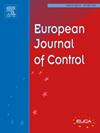利用量化周期事件触发和 1 位数据传输实现 LTI 系统的输出反馈控制
IF 2.5
3区 计算机科学
Q2 AUTOMATION & CONTROL SYSTEMS
引用次数: 0
摘要
本文提出了一种新颖的线性系统周期性事件触发控制(PETC)与动态量化相结合的框架。与传统的时间驱动控制方法不同,我们的方法利用基于事件的机制来明智地更新控制行动,从而最大限度地减少计算负荷和网络流量。我们引入了两级动态量化器,用单个比特对反馈信息进行编码,从而提高了资源效率。提议的 PETC 机制根据量化输出样本决定传输实例。由此产生的系统被建模为混合动态系统,以捕捉连续和离散动态。我们以线性矩阵不等式的形式提出了确保闭环系统稳定性的充分条件。通过数值模拟,我们证明了我们的方法能在有限的时间内捕获初始输出,与传统方法相比大大减少了数据传输。本文在动态量化与 PETC 的整合方面做出了重要贡献,从而实现了资源节约型稳定控制系统。本文章由计算机程序翻译,如有差异,请以英文原文为准。
Output feedback control of LTI systems using quantized periodic event-triggering and 1-bit data transmission
This paper presents a novel framework for periodic event-triggered control (PETC) coupled with dynamic quantization for linear systems. Unlike traditional time-driven control methods, our approach leverages event-based mechanisms to judiciously update control actions, thus minimizing computational load and network traffic. We introduce a two-level dynamic quantizer for encoding feedback information with a single bit, thereby enhancing resource efficiency. The proposed PETC mechanism decides the transmission instants based on the quantized output samples. The resulting system is modeled as a hybrid dynamical system to capture both continuous and discrete dynamics. Sufficient conditions for ensuring the stability of the closed-loop system are presented in the form of a linear matrix inequality. Through numerical simulations, we demonstrate that our approach captures the initial output within a finite time and significantly reduces data transmissions compared to traditional methods. This paper makes key contributions in the integration of dynamic quantization with PETC, leading to resource-efficient and stable control systems.
求助全文
通过发布文献求助,成功后即可免费获取论文全文。
去求助
来源期刊

European Journal of Control
工程技术-自动化与控制系统
CiteScore
5.80
自引率
5.90%
发文量
131
审稿时长
1 months
期刊介绍:
The European Control Association (EUCA) has among its objectives to promote the development of the discipline. Apart from the European Control Conferences, the European Journal of Control is the Association''s main channel for the dissemination of important contributions in the field.
The aim of the Journal is to publish high quality papers on the theory and practice of control and systems engineering.
The scope of the Journal will be wide and cover all aspects of the discipline including methodologies, techniques and applications.
Research in control and systems engineering is necessary to develop new concepts and tools which enhance our understanding and improve our ability to design and implement high performance control systems. Submitted papers should stress the practical motivations and relevance of their results.
The design and implementation of a successful control system requires the use of a range of techniques:
Modelling
Robustness Analysis
Identification
Optimization
Control Law Design
Numerical analysis
Fault Detection, and so on.
 求助内容:
求助内容: 应助结果提醒方式:
应助结果提醒方式:


